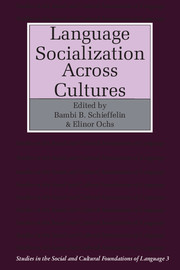Book contents
- Frontmatter
- Contents
- List of contributors
- 1 Introduction
- Part I Acquiring language and culture through interactional routines
- Part II Acquiring knowledge of status and role through language use
- 6 Social norms and lexical acquisition: a study of deictic verbs in Samoan child language
- 7 The acquisition of register variation by Anglo-American children
- Part III Expressing affect: input and acquisition
- Index
7 - The acquisition of register variation by Anglo-American children
Published online by Cambridge University Press: 05 June 2012
- Frontmatter
- Contents
- List of contributors
- 1 Introduction
- Part I Acquiring language and culture through interactional routines
- Part II Acquiring knowledge of status and role through language use
- 6 Social norms and lexical acquisition: a study of deictic verbs in Samoan child language
- 7 The acquisition of register variation by Anglo-American children
- Part III Expressing affect: input and acquisition
- Index
Summary
Firth noted many years ago that “Every human being is a bundle of institutionalized roles. He has to play many parts, and unless he knows his lines as well as his role he is no use in the play” (quoted in Verma 1969:293). The research described in this paper was designed to examine how and when preschoolers in middle-class Anglo-American cultures learn their “lines,” i.e., how they acquire full communicative competence (Hymes 1972). As children become active members of any language community, they must learn to speak not only grammatically but also appropriately. Children in all societies must, at some time during acquisition, learn a variety of sociolinguistic and social-interactional rules that govern appropriate language use. Even where the language addressed to 2-year-olds may be of highly specialized nature, by the time these children reach age 4 or 5, they have experienced diverse speech settings: They go to the doctor, to preschool, to birthday parties, to the grocery store. They participate in a variety of speech situations, with people who differ in age, sex, status, and familiarity, and whose speech will therefore vary in a number of systematic ways. This type of language variation has been described for a number of situations in American English under the rubric of register variation (see Andersen 1977, in press or Ferguson 1977 for more detailed summaries of work on registers). The range of registers examined in the study described below included “babytalk,” “foreigner talk,” “teacher talk,” and “doctor talk.”
- Type
- Chapter
- Information
- Language Socialization across Cultures , pp. 153 - 162Publisher: Cambridge University PressPrint publication year: 1987
- 3
- Cited by



